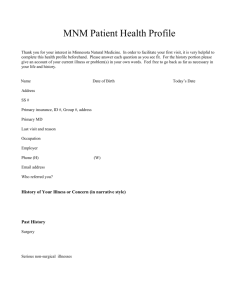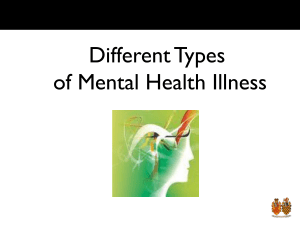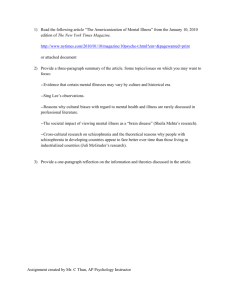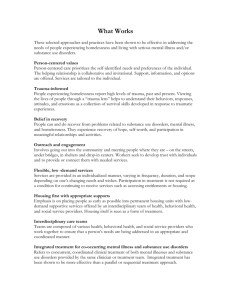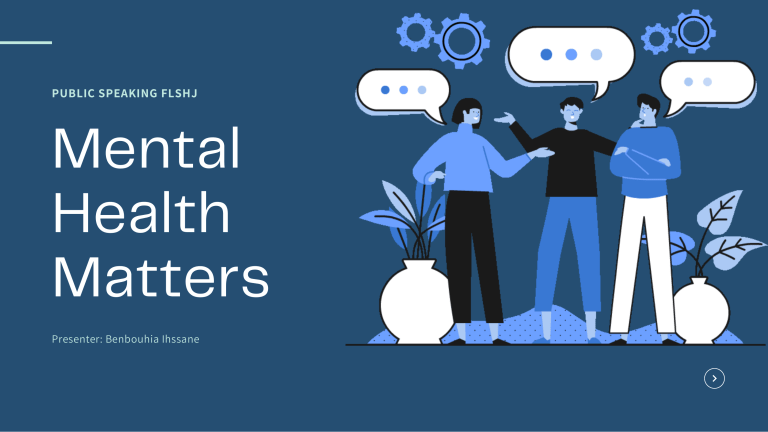
PUBLIC SPEAKING FLSHJ Mental Health Matters Presenter: Benbouhia Ihssane The Speaker Ihssane Benbouhia Outline 1. WHAT SHOULD WE KNOW ABOUT MENTAL HEALTH? 2. WHY IS GOOD MENTAL HEALTH IMPORTANT? 3. DIFFERENCE BETWEEN MENTAL HEALTH AND MENTAL ILLNESS? 4. TYPES OF MENTAL ILLNESSES 5. FACTORS THAT CAN INFLUENCE YOUR MENTAL HEALTH 6. EARLY WARNING SIGNS OF POOR MENTAL HEALTH 7. HOW TO MAINTAIN GOOD MENTAL HEALTH? What We Should Know About Mental Health What Whould We Know About Mental Health ? Like physical health, everyone has mental health. Physical health is the state of your body, and mental health is the state of your mind, feelings, emotions, psychological, and social well-being. It affects how we think, feel, and act. It also helps determine how we handle stress, relate to others, and make choices. Mental health is important at every stage of life, from childhood and adolescence through adulthood. QUOTE Mental Health is taking care of your mind. As long as you take care of your mind you claim your power back. I.Q Why is good mental health important ? What is Good Mental Health? Being “mentally healthy” does not necessarily mean the absence of illnesses such as depression, schizophrenia, PTSD, bi-polar disorder, etc. Instead, it is characterized by the following: The ability to learn The ability to feel, express and manage a range of positive and negative emotions The ability to form and maintain good relationships with others The ability to cope with and manage change and uncertainty What is Good Mental Health? All of us will have our struggles from time to time, but good mental health helps us bounce back and stay in control when times get tough. Being in a state of good mental health allows us to maintain healthy relationships as well as our physical well-being. Plus, we make solid life choices that are for the betterment of ourselves and those around us. Benefits of Good Mental Health Positive mental health allows people to: Feel good Think clearly Enjoy life Cope with the stresses of life Work productively Be physically healthy Have good relationships Make meaningful contributions to your community Realize your full potential Difference Between Mental Health and Mental Illness ? Difference Between Mental Health and Mental Illness While mental health is always there and may be positive or negative, mental illness refers to a wide range of mental health conditions that affect a person's thinking, feeling, behavior or mood over a long period of time. A mental illness can deeply impact day-today living and coping with work, relationships, and other demands. But in most cases, those symptoms can be managed with a combination of medications and talk therapy (psychotherapy). Types Of Mental Illnesses There are many different kinds of mental illness including: personality disorders (Narcissistic, borderline PD..) mood disorders (Depression..) anxiety disorders (Obsessive-compulsive D, PTSD, Panic attack..) eating disorders (Anorexia, Bulimia..) psychotic disorders (Schizophrenia, Dementia..) Types Of Mental Illenesses Experiencing any of these illnesses can be very challenging, but mental illnesses can be treated with the help of a pschotherapy, medications and supplements. Factors That Influence your Mental Health Factors That Influence your Mental Health Mental health problems can have a wide range of causes. It's likely that for many people there is a complicated combination of factors – although different people may be more deeply affected by certain things than others. For example, the following factors could potentially result in a period of poor mental health: Loneliness And Isolation Factors That Influence your Mental Health relocation of your spouse, family member, partner or friend living on your own poor family connection difficulties socialising and feeling like you don’t belong poor physical health or frailty unable to participate in activities due to illness, mobility or transport issues retirement from work a lack of purpose or meaning in life language barriers or reduced connections with your culture Grief And Loss death of a loved one Factors That Influence your Mental Health the end of a relationship loss of a job losing a way of life children leaving home separation from friends and family. Others Factors That Influence our Mental Health Biological factors, such as genes or brain chemistry Bullying Life experiences, such as trauma or abuse Unemployment or loss of business Financial worries Domestic And Family Violence Severe or longterm stress being a longterm carer for SO Alcohol and other drug use Early Warning Signs of poor mental health Early Warning Signs Experiencing one or more of the following feelings or behaviors can be an early warning sign of a problem: Eating or sleeping too much or too little Pulling away from people and usual activities Having low or no energy Feeling numb or like nothing matters Having unexplained aches and pains Feeling helpless or hopeless Smoking, drinking, or using drugs more than usual Feeling unusually confused, forgetful, on edge, angry, upset, worried, or scared Yelling or fighting with family and friends Experiencing severe mood swings that cause problems in relationships Having persistent thoughts and memories you can't get out of your head Hearing voices or believing things that are not true Thinking of harming yourself or others Inability to perform daily tasks like taking care of your kids or getting to work or school How To Maintain A Good Mental Health Ways to maintain positive mental health include: Talk about your feelings or write them down Get enough sleep Eat Well Be active= Take care of your personal hygiene Get plenty of sunlight Exercise Ways to maintain positive mental health include: Value yourself Be present =Mindfulness Stay positive Surround yourself with good people Ways to maintain positive mental health include: Do something you enjoy Set realistic goals Learn new skills Do some creative arts therapies Ways to maintain positive mental health include: Self-kindness = Forgive yourself Pray Practice Meditation Practice gratitude

